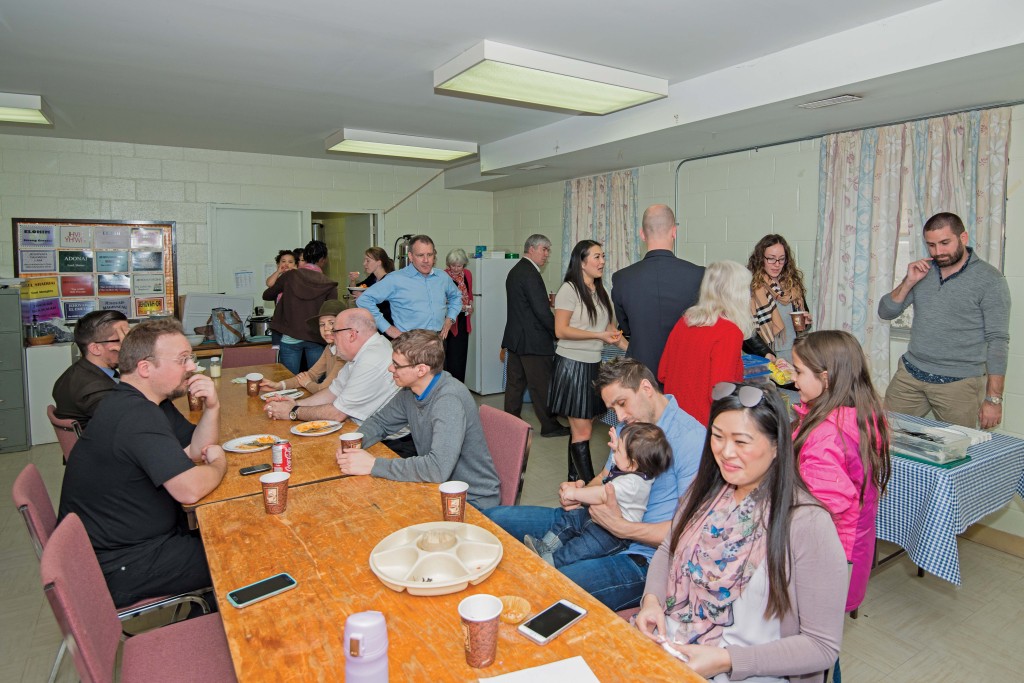You have free articles remaining this month.
Subscribe to the RP Witness for full access to new articles and the complete archives.
In mid-19th Century Toronto, Presbyterianism was a dominant form of Protestant Christianity. Many names known in the city today were Presbyterians, such as George Brown. In 1875, four branches of Presbyterianism joined to form the Presbyterian Church in Canada—including most Reformed Presbyterian and Free Church of Scotland congregations.
In 1921 Highland Scot migrants to Toronto pledged unqualified adherence to the Westminster standards and to a biblical form of worship. In 1928 they petitioned the General Assembly of the Free Church of Scotland, and a congregation was formed around 1930. By the grace of God, in the midst of an economic depression, they managed to raise sufficient funds to purchase land in downtown Toronto and construct a church building, which was the congregation’s temporal home from 1931 to 1976.
A report to the General Assembly in 1931 observed: “Our brethren across the Atlantic are very much in need of settled ministers. When deputies go out they are entreated to stay for a reasonably long period. The response to this request is not always encouraging, especially during the Winter. Nonetheless, many good men did respond to the ‘entreaty’ and ‘went out’ to serve in Toronto for varying periods, alongside the faithful leaders and people here.”
In the fullness of God’s timing, Rev. John Macsween was sent in 1947 to help in Canada for a 10-month period. The Foreign and Overseas Missions Committee gave him a roaming commission to serve several congregations without pastors. In 1951 he moved to Toronto where he became the church’s first settled pastor, serving until 1966. From 1967 to 1973, Rev. J. N. (Jack) MacLeod, later a moderator of the Free Church, served as pastor.
In 1977 Rev. David Compton became our first (and so far, only) Canadian pastor, serving until 1992. During that period, notable changes occurred in our life together. The downtown site was sold, and the church moved to the present Sheppard Avenue location in the suburbs; we changed our name to Evangelical Presbyterian Church, and we adopted the RPCNA Psalter.
In 1993 the Rev. Kenneth Stewart became our minister until he was called to Stornaway in Scotland in 1996. In 1997 God’s faithfulness to us was again demonstrated by the arrival of the Rev. D. Allan MacLeod, who has served faithfully as pastor for 20 years.
The Sheppard Avenue corridor was rezoned for high density residential and office/commercial development, and a subway was constructed, which opened in 2002. Our property was eyed by developers. However, a buyout would not have provided sufficient funds for the congregation to relocate within the Toronto city limits. We also wished to retain our central location, which is ideally situated near a subway stop and major highway.
We decided to work with a developer who would build a new church building as part of a redevelopment of our property. After about two years of negotiation, we signed a purchase agreement in 2010.
Working with an architect commissioned by the developer to design our new church building within the context of the overall redevelopment, we reached agreement on the floor plans in 2012. Construction of the new building began fall 2015. God willing, we will move into the new building this year.
Other momentous events occurred in the life of our congregation. During David Compton’s time as pastor, he encouraged the congregation to align with a North American denomination. However, this initiative did not proceed beyond a discussion phase with the RPCNA and other like-minded denominations.
In 2011, the General Assembly of the Free Church of Scotland voted to permit the use of human compositions as worship and the use of musical instruments to accompany singing. With these changes, the elders of the congregation reopened the idea of petitioning for admission to the RPCNA. Pastor MacLeod and elder Rod Finlayson attended the RPCNA Synod in 2011. An application to join the RPCNA was submitted in early 2012.
In 2014 the congregation was informed that the General Assembly of the Free Church gave a deliverance which stated, “The General Assembly recognize the particular circumstances of North American congregations and acknowledge that the movement of these congregations with indigenous denominations might be an appropriate step.” This deliverance was a convincing indication that it was time for our congregation to align with a North American denomination that held to the same doctrinal position as our congregation. We received notification in September 2014 that our congregation would be received into the RPCNA. At a congregational meeting in November, the congregation voted overwhelmingly to join the RPNCA. Our congregation was formally received in October 2015.
